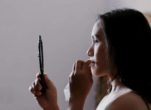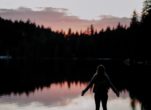
In Me I Trust
It’s not about trusting others. The most important thing is trusting yourself. To step up, to stand up, to speak up. To set boundaries and say no, or yes. To expect respect and to walk away when it isn’t given, no matter what the reason.
But how can you do this when you were taught as a child that you can’t trust your own judgment?
“Oh you’re not cold.”
“You just ate. You’re not hungry.”
“You don’t really want to be friends with her.”
“I’m sure you didn’t mean that.”
These are the innocuous examples, in themselves not so damaging. But when repeated over years, the damage accumulates.
Then there are the more destructive examples, most commonly when a child reports abuse and is called a liar.
All these experiences lead to the erosion of self-trust. We learn we cannot trust our own reality, because we’re constantly being told that what we’re feeling is wrong, that what we’re experiencing is not happening. Later, when someone is rude and disrespectful to us, we question ourselves.
A friend who came out of an abusive relationship had lost so much trust in herself that she had to look at other drivers to be sure the light had really turned green. She couldn’t drive forward until they did, because she trusted their judgment over her own, which she no longer trusted at all.
I have no problem going up in airplanes, even tiny ones, because someone else is in control. Put me in scuba gear or ice skates and I panic—not because I’m an anxious person, but because now it’s me in the driver’s seat, and I don’t trust this driver. Anyone but her. I’m a control freak in reverse: I don’t want to be in control. I can’t be trusted.
So I enrolled in a Gestalt therapy group. I learned about boundaries, that I wasn’t responsible for other people’s feelings, they weren’t responsible for mine. Who knew? I can own my own reality. I’m free, I thought. Except I wasn’t. Because even though I now knew what boundaries were (I even taught the concept to others), I couldn’t set them.
I couldn’t trust my judgment enough to know when it was time to set one. Someone would cross my boundary, I would start preparing my “I” statements and other assertive responses, and suddenly I’d be wondering if I’m just being too sensitive, or maybe I misunderstood.
They will tell you that, these boundary crossers. They’ll tell you you’re overreacting, that it didn’t happen that way, that you’re imagining things. So you let it go this time. And then the next.
You’re being mistreated because you couldn’t trust yourself enough to say, “Hey, stop! This is not ok with me!” With every incident you strengthen your belief that people in general can’t be trusted. After all, it’s happening again.
In my last relationship, the warning signs were there early, as they usually are. We see them with hindsight. We see them at the time too, but we just don’t heed them.
He snapped at the waiter. Next he snapped at the hotel clerk. He was banned from the hairdresser after he made one of the staff cry. And then he yelled at me.
I told him it wasn’t ok. He told me all couples do this. I told him I didn’t want to be one of those couples. He told me I was too sensitive. I’d heard that before. The doubts kicked in. I let it go. And he yelled at me again.
Unless we can set boundaries to create a place of personal safety, we will always feel like we’re in danger. So how do we learn to trust ourselves, in doing so eliminating the need to mistrust everyone else?
We do it by listening to our bodies instead of our heads, heeding our feelings instead of our thoughts. Your body will always tell you when something feels off. Your head will always step in and say, “Yes, but ….”
Your head has hundreds of scenarios to throw at you, tripping you up and tangling you in confusion. It means well. It doesn’t want you to make a fool of yourself by getting it wrong, and you have a history of getting it wrong, or so you’ve been told.
Your body knows the truth. It has one response—either it feels ok or it doesn’t. Don’t let your head drown this out. Go with your body every time.
You don’t need others to be trustworthy. You need to trust yourself to notice when they aren’t trustworthy, and to act accordingly. This isn’t easy when you’ve had a lifetime of self-doubt that feels like second nature.
It’s an old habit, and habits are changed by having corrective experiences. Get into the practice of checking in with your body every day. This is where your truth lives.
When we make these changes, those around us will often not support our boundary-setting. Judge your success on whether you honor your own needs while conveying them respectfully to others, not on how others respond.
Sometimes the pendulum swings too far and we get very angry. Know that this is a temporary over correction. You will not become an aggressive narcissist; you are simply finding your edges and establishing where middle ground is.
Trusting in yourself will open the door to a new world, and your body will guide you home.











1 comment to "In Me I Trust"